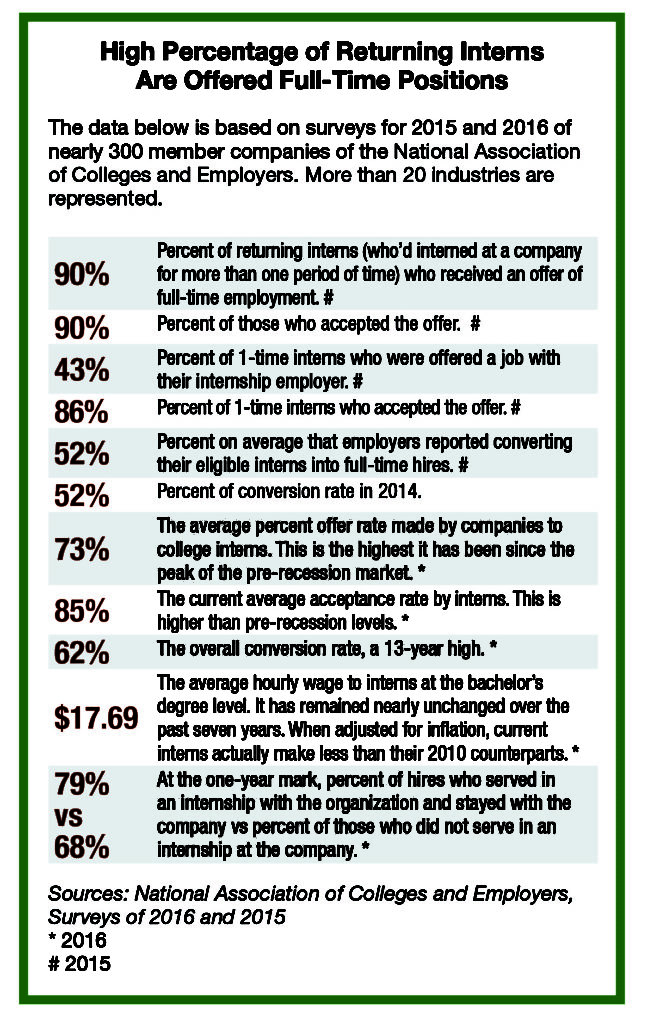
[Editor’s Note: We welcome submissions from millennials about relevant topics. With summer at the halfway point, this article’s takeaways will be excellent for senior communicators to pass to summer interns. The authors are: Kevin Kearney, project assistant, APCO Worldwide and Lindsey Malcolm, internal communications assistant, APCO Worldwide, with commentary from Becky Boles, senior director, APCO Worldwide.]
So here you are: You’ve landed your dream summer internship. Look at you! Being an ambitious, forward-thinking go-getter, you’re already wondering how to convert it into a full-time job.
We were in your shoes not long ago. Below are the most important things we did as interns to land full-time gigs. To add perspective, we’ve invited our boss, Becky Boles, to add her thoughts on what it takes to get hired by a major communications firm.
1. Submit Only Client-Ready Work: The tip is clear—only put forth your best. Never make the assumption that someone will have the time to review your work before sending it to a client. Whether the work is for your equal, superior or an executive at your firm, be intentional and carry the weight of the assignment to its fullest extent. Interns who demonstrate they’re capable of doing client-ready work will be hired to do client-ready work.
Becky Boles: When you start out in your career, especially as an intern, you may feel you’re doing monotonous, tedious work that no one is paying attention to. But that’s not the case. Every assignment you do will either be sent to the client or serve as a building block to something bigger. And people are watching. If they feel you can nail the small assignments, they’ll be willing to let you take on the bigger ones.
2. Don’t Let Work Come to You. Go After It:
Occasionally, you’ll find yourself with a moment where your bandwidth isn’t as stretched. If you have capacity, volunteer for work that falls outside of your wheelhouse. Proactivity, willingness to diversify experience and versatility certainly don’t hurt your professional reputation. Doing so also allows you to interact with more people across the network, prove your worth and become the go-to intern. Slow days happen; what you do on those days defines who are you are as a young professional, and it won’t go unnoticed.
BB: I think this is the single most important piece of advice to interns. Generally, summer internships last three months. Use this time to make yourself known. Raise your hand for projects. Stop in and talk to the boss…and maybe even the boss’s boss. Find out what they’re working on and tell them you’re available and interested to help. And when you help, take every project to the next level. When you’re doing an audit, include a summary of what you think your research means. When you’re drafting social content, come up with something new and interesting.
3. Speak Up and Be Quiet: We’ve been fortunate that our firm has always encouraged everyone to raise his/her voice when they have a good idea or opinion. Being able to vocalize your thoughts and engage as a team member proves you’re ready to make the leap from intern. But it’s also important to be intentional with what you say and when you say it. A good young professional knows when to speak with purpose, as well as listen, observe and learn.
BB:Listen, observe and learn. This is critical, especially during the outset. Soak all of it in so you understand the subject matter, players and dynamics. But behind the scenes, work like mad always to be one step ahead of your teams. If you’ve been invited to a brainstorm, read the brief and research the topic in advance. Come to the brainstorm with a nugget of information no one else will know. Then find the right opportunity to speak up and add value.
4. Feedback, Feedback, Feedback! If you’re willing to accept praise, also be open to constructive feedback about how you can improve. Constructive criticism can be hard for professionals to hear, but it demonstrates a sense of maturity and eagerness to grow. On the flip side, your manager may be hesitant to come across as critical. Don’t be afraid to gently push them to tell and show you how you can improve. Critical feedback only makes you stronger.
 BB: I’ve seen so many talented professionals falter early in their careers. You have so much to learn when you’re beginning, in addition to the actual work: how to behave in a professional setting, how to deal with a diverse set of bosses, how to use the phones. Good managers will give you constructive feedback. If they don’t, ask for it. You are destined to make mistakes, and to be better at some things than others. As a working professional you have two choices when receiving constructive criticism: get upset, or take it on board and learn from it. Those who are truly successful accept feedback and become better because of it.
BB: I’ve seen so many talented professionals falter early in their careers. You have so much to learn when you’re beginning, in addition to the actual work: how to behave in a professional setting, how to deal with a diverse set of bosses, how to use the phones. Good managers will give you constructive feedback. If they don’t, ask for it. You are destined to make mistakes, and to be better at some things than others. As a working professional you have two choices when receiving constructive criticism: get upset, or take it on board and learn from it. Those who are truly successful accept feedback and become better because of it.
5. Lift Your Colleagues: Be someone others want to be around and work with. Having a positive attitude and outlook with your peers goes a long way. Positivity is an enabler of productivity and pushes others forward. This doesn’t mean that you always have to be a ray of sunshine, but when possible, be a source of light for your colleagues. On the days that matter most, they’ll be there for you the way you’re there for them.
BB:Your colleagues want to be around people who are exciting and energizing. It reminds them why they got into this business in the first place! You won’t come to the table with the most experience, so make up for it by coming with the most passion. Don’t pretend to be someone you’re not, but express your passion in a way that makes sense for you.
Contact: bboles@apcoworldwide.com
This content appeared originally in PR News Pro, July, 25, 2016. For subscription information, please visit: https://www.prnewsonline.com/about/info
